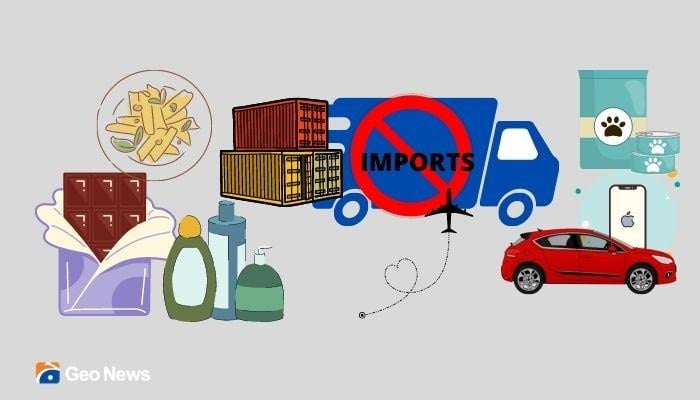‘Too early’, ‘nothing major’: Experts on govt's move to scrap import ban
Geo.tv reaches out to economic experts to analyse possible impact on economy of removal of import ban on luxury items
August 18, 2022

The coalition government announced its decision to lift the import ban on non-essential and luxury items — three months after the restriction was imposed — in order to comply with the International Monetary Fund’s (IMF) conditions.
However, while this decision might look good on paper there is more to it.
Finance Minister Miftah Ismail, addressing a press conference, also clarified that the government was scrapping the import ban as it was an international requirement, but it plans to impose regulatory duties on the non-essential imported items that will be three times higher than the current levels.
Geo.tv reached out to economic experts to gauge their take on the government’s decision and its possible impact on the economy in the future.
Uzair Younus, director of the Pakistan Initiative at the Atlantic Council’s South Asia Center, said this decision will not have a major impact and the signal that this was going to happen was given weeks ago.
“The State Bank of Pakistan (SBP) is continuing to restrict letter of credits (LCs) which is how imports are being slowed and this is likely to continue to maintain somewhat of a balance between imports and exports,” he said.
'It is a little early'
Alpha Beta Core CEO Khurram Schezad, however, thinks that the government was "too early" in lifting the ban on imports.
"I think it's a little early, but on the other hand, we have to be liberal in trade given the fact that IMF, WTO, and other trade pacts would want countries to stay liberal in both imports and exports," he said.
Analyst Saad Ali said that the government is complying with IMF conditions ahead of programme resumption, but it will counter the decision with prohibitive taxes on non-essential and luxury imports.
Talking about the impact of the decision, Ali said that given that interest rates are high and the rupee remains quite weak, he doesn't expect a quick or big increase in imports.
"If the economy continues to improve, with the realisation of external flows in the coming months, then imports may start to rebound. This should not materially change CAD in the coming months."
‘Ban on import was hurting export sector’
“The ban on import was hurting the export sector which requires imported raw material,” Sustainable Development Policy Institute Executive Director Abid Qaiyum Suleri said, hailing the government's decision to end the ban.
He highlighted that as a member of the World Trade Organisation, we cannot unilaterally ban imports until we have an economic emergency or balance of payment crisis endorsed by the IMF.
“The ban was imposed for a limited period, and it did have its positive impact on bridging the trade deficit as well as curbing the demand of dollars,” he said, adding that now that the government has decided to increase regulatory duty on luxury items it will increase the price of such items and discourage unnecessary imports.
He further added that it will help improve the confidence of many sectors such as car assemblers who have shut down their assembly plants due to a lack of CKD kits
“The flip side is that it will increase the demand of dollar and rupee will come under pressure,” he added.
Meanwhile, former advisor to Finance Ministry Dr Khaqan Najeeb said that Pakistan has lifted the ban keeping its international commitments on the import of goods and Islamabad’s programme with the Fund resumes on August 29.
“Remember that these bans are largely symbolic as they cover a very small percentage of the imports,” he said, adding that the government is likely to increase import duties on luxury items to the extent where their import would become largely infeasible for the people in the country — so that their level of import remains at the minimal level.
The former advisor also said that the decision to scrap the ban must also have been taken in the context of the restrictions imposed by the central bank.












